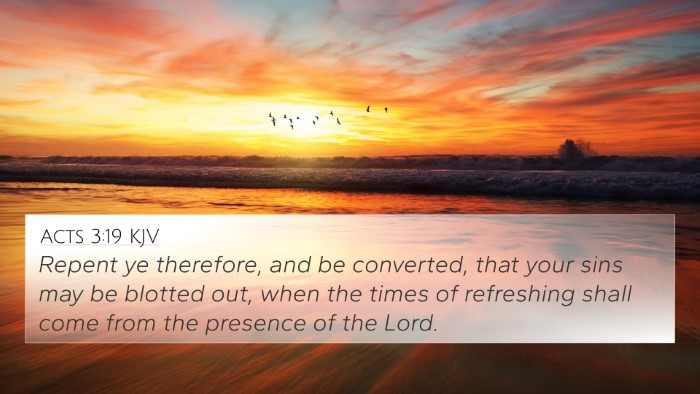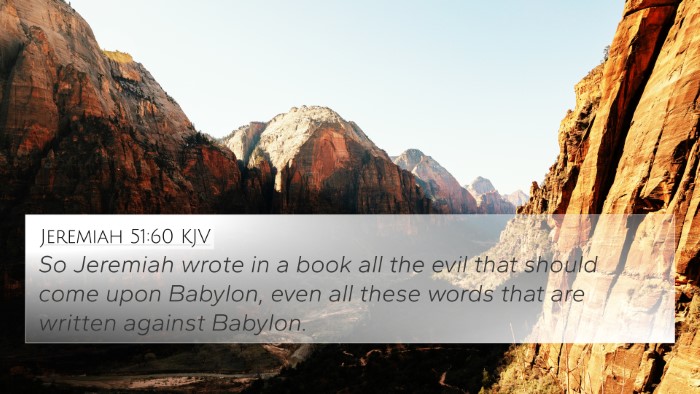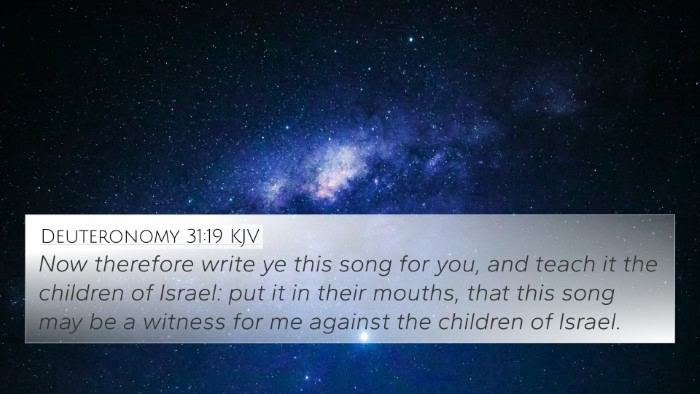Understanding Numbers 5:23
Numbers 5:23 reads:
"And the priest shall write these curses in a book, and he shall blot them out with the bitter water."
Summary of Interpretation
Numbers 5:23 is part of a passage addressing the ritual of the "bitter water" that a woman accused of adultery would undergo. This verse signifies the actions taken by the priest as he conveys the potential consequences of the woman's infidelity.
Commentary Insights
- Matthew Henry: Henry emphasizes the gravity of the accused's situation. He discusses how the writing of curses represents a formal accusation and shows that sin leads to serious repercussions. Henry also relates this to God’s holiness and justice.
- Albert Barnes: Barnes interprets this act of writing curses as a measure to ensure that the accused has a clear understanding of the charges and their implications. He notes that this ritual serves to instill fear, which should lead to confession and repentance. Barnes also points to the underlying theme of divine order in maintaining community integrity.
- Adam Clarke: Clarke elaborates on the significance of bitter water symbolizing the bitterness of sin. He indicates that the ritual serves both as a test of faithfulness and a divine judgment, with the written curses ensuring that all is transparent before God. Clarke connects it to broader themes of faith and fidelity in relationships.
Related Bible Verses
This verse can be cross-referenced with the following:
- Deuteronomy 22:22: Discusses laws surrounding adultery and the consequences.
- John 8:4-5: Highlights the act of bringing a woman accused of adultery before Jesus, paralleling the theme of judgment.
- Leviticus 20:10: Specifies the punishment for adultery, showing the serious nature of the sin.
- 1 Corinthians 6:9-10: Lists those who will not inherit the Kingdom of God, including fornicators and adulterers.
- Galatians 6:7: Teaches that one reaps what they sow, linking the consequences of actions with divine justice.
- Proverbs 6:32: Warns against adultery and highlights its utter folly, which connects to the need for the ritual described in Numbers.
- Matthew 5:27-28: Expands on the understanding of adultery from an internal perspective, reinforcing moral accountability.
Connections Between Bible Verses
This verse illustrates vital connections throughout Scripture, enhancing our understanding of divine law and human conduct. The themes discussed in Numbers 5:23 resonate with many other scriptures, enabling a deeper comprehension of God's expectations and the consequences of sin.
Thematic Insights
Through comparative analysis, we see the shared themes of:
- Divine Judgment: How God reveals truth and executes justice.
- Community Integrity: The importance of upholding moral standards.
- Faithfulness in Relationships: God’s design for marital fidelity and the consequences of betrayal.
- Ritual Purity: The measures taken to maintain spiritual purity within the community.
Cross-Referencing Tools
To further explore the connections between Bible verses, consider utilizing the following resources:
- Bible Concordance: A tool that helps locate verses and themes across the Bible.
- Cross-Reference Bible Study: Methods to study interrelated scriptures that support or illuminate theological themes.
- Comprehensive Bible Cross-Reference Materials: Books and resources that compile cross-references for deeper study.
Using Cross-References for Deeper Insight
Understanding Numbers 5:23 can be greatly enriched by cross-referenced study methods:
- Identify connections between Old and New Testament teachings.
- Explore links between the Prophets and Apostolic teachings.
- Engage in inter-Biblical dialogue to see Christ fulfilling Old Testament laws.
Conclusion
Numbers 5:23 not only serves as a historical and ritualistic passage but opens a dialogue about God's character in terms of justice, mercy, and the sanctity of marriage. By exploring thematic connections and utilizing effective cross-referencing tools, believers can gain a richer understanding of how to navigate the complexities of faith, obedience, and the serious nature of transgressions against God's design.














